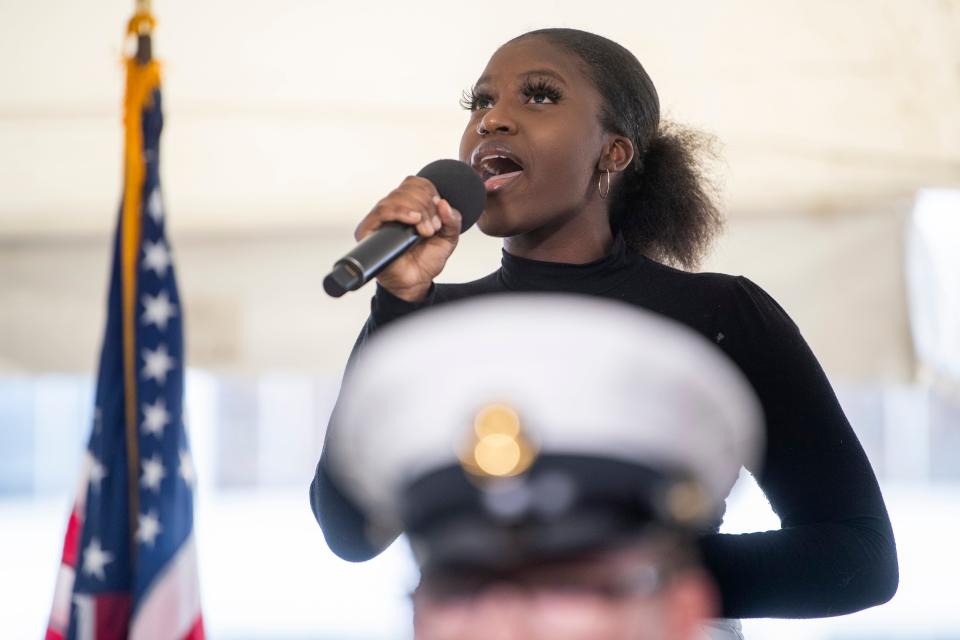In her first in-person State of the City address Friday afternoon, Knoxville Mayor Indya Kincannon announced what could be her hallmark proposal — a $15 an hour minimum wage for city workers and raises across the board — but coupled with a request for a 50-cent increase in the property tax rate, the highest proposed rate increase in decades.
Roughly 80% of the new revenue from the proposed increase will be used for employee compensation, which the city estimates will cost roughly $16 million. If approved by the City Council, the increase would bring the city’s property tax rate to $2.96 per $100 of assessed value.
The city estimates the proposed rate will cost $10 extra a month for properties valued at $100,000. Owners of properties valued at $200,000 would pay roughly $20 more a month, and $52 more a month for properties valued at $500,000. The median home price in 2021 was $287,000, according to Knoxville Area Association of Realtors.

Still, with property reappraisals still coming in from the Knox County Property Assessor, the estimated certified tax rate is expected be the lowest in the city since at least 1974.
“I’m not willing to sacrifice Knoxville’s safety and quality of life by being pennywise and pound-foolish,” Kincannon said. “We need high-quality core services and infrastructure to keep Knoxville’s positive momentum going. We can’t print money and we can’t go into the red and we cannot use our savings account for recurring expenses.”
Overall, the $434.1 million proposed budget is up from last year’s $384.2 million the council approved as the city began to shake off its COVID-19 cobwebs. Friday was the first in-person speech of this type since 2019 due to the pandemic.
Among other changes, Kincannon proposed $77 million for the city’s capital fund, something Kincannon called her parks, pavement and pipes plan. She also touted another infusion of city dollars toward affordable housing.
She didn’t, however, use the speech set on the campus of the forthcoming police headquarters to name the city’s next police chief. Eve Thomas’ last day as chief is May 1 and Kincannon reiterated her intention of naming a new chief by the end of the month.
A tax increase was coming
The city’s budget crunch is part of its own making and partly due to forces out of its control.
Related: Knoxville mayor is likely to seek a property tax increase to ease budget crunch
OPINION: Kincannon should name police chief finalists; it’s in her own best interest
Earlier this year, Susan Gennoe, the city’s chief financial officer, said next year’s budget (the budget Kincannon proposed Friday) is the “cautionary year” in which the fund balance, known as a rainy-day fund, shrinks below what rating agencies think is safe.

The bottom line is the city has been spending more than it has been taking in and doing that by dipping into the rainy day fund. This is not unusual for a city to do but it’s not something sustainable long term.
With inflation through the roof, it would stand to reason that the city would benefit from something like the county’s appraisal process, which is increasing bills across the county but the property tax rate is graded down, meaning the city does not benefit from inflation. City leaders are quick to say property owners pay less today proportionately than they did a decade ago once inflation and reappraisals are factored in.
So what was coming was a property tax increase, a cut in city services, or both. And with 2023 being an election year, Kincannon had few good options. It’s politically survivable. Both Mayors Bill Haslam (35-cent) and Madeline Rogero (34-cent) passed an increase early in their tenures and both easily won re-election.

During her speech, Kincannon asked a string of rhetorical questions about whether the city should cut back on services, stop building forward or, she said, raise new revenues to fill in the gap.
“So please know this decision was not made lightly,” she said. “We have tightened our belts and have looked at areas to cut back but we must meet the needs of our city.”
The city has consistently received the highest or next-highest bond ratings given by rating agencies Fitch, Moody’s, and Standard and Poor’s. It is still considered fiscally sound.
Pay raises in a competitive labor market
Earlier this year, Kincannon announced she would propose a $15 an hour minimum wage and a 6% across the board raise for city employees. The push comes as a new compensation study found city salaries, on the whole, are 10% below the market rate.
Kincannon said the raises will cost the city about $16 million. Raises will not be for city executives.

“This is not only the right thing to do for our hard-working employees,” she said. “It is the right thing to do for all of us who work and live here and rely on our police, fire and non-uniformed workers who keep our neighborhoods safe and livable.
“Our first responders always have our backs and now it’s time that we’ve got theirs,” she continued.
The city also hopes the money will help woo employees to the city, which currently has over 140 openings, including roughly 50 openings at the police department.
Other budget notes
Investing $8.6 million in transportation infrastructure at specific high-priority locations, including funds to create separated bike-pedestrian paths on popular routes:
Investing $2.3 million on fire and police vehicles and equipment, including creation of what the city is calling a Real Time Crime Center:
-
Providing nearly $5.8 million for core public safety partners, including the Behavioral Health Urgent Care Center, Family Justice Center, McNabb Center, Young-Williams Animal Center and E-911
-
Providing $1.5 million in Community Agency Grants to local nonprofits providing services ranging from mental health and addiction treatment to youth-serving programs
Investing more than $20 million to upgrade aging city stormwater and utility infrastructure (funded through the American Rescue Plan Act):
-
This includes priority investments, such as the Cherry Street Drainage Project ($2.3 million), flood mitigation and resiliency ($1.3 million), dilapidated pipe remediation ($1 million), Baum Drive Improvement Project ($700,000)
-
It includes another $2.75 million dedicated to improving water quality, restoring streams (including 1,000 linear feet of creek restoration in Mary Vestal Park)
Investing $10.8 million to increasing the availability of affordable housing and provide pathways to housing and stability for people experiencing homelessness:
-
$4.2 million – Transforming Western plan for Western Heights
-
$1.6 million – First Creek at Austin Homes
-
$2.5 million – Affordable Rental Development Fund
-
$1 million – local funds (supplemented by $1.3 million in federal assistance) supporting homelessness services, including street outreach and the Foyer, a low-barrier shelter
-
$1.5 million – federal funds for permanent supportive housing
Investing some $10.2 million in park improvements including what the city is calling “significant investments” at:
Tyler Whetstone is a Knox News politics reporter focusing on Knoxville and Knox County.
Connect with Tyler: Twitter | Email
Make our community, our society and our republic stronger by supporting robust local journalism. Subscribe online at knoxnews.com/subscribe.
This article originally appeared on Knoxville News Sentinel: Knoxville mayor wants $15/hour minimum wage and property tax increase



More Stories
Are Dubai Villas the Ultimate Real Estate Investment?
Foreclosure Property Money Pits – Advice From a Certified Home Inspector
7 Tips For Finding A Home To Buy